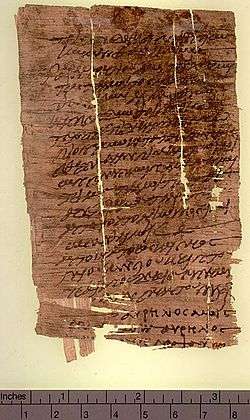Libellus
A libellus (plural libelli) in the Roman Empire was any brief document written on individual pages (as opposed to scrolls or tablets), particularly official documents issued by governmental authorities.

The term libellus has particular historical significance for the libelli that were issued during the reign of Emperor Decius to citizens to certify performance of required pagan sacrifices in order to demonstrate loyalty to the authorities of the Roman Empire. During later periods libelli were issued as certificates of indulgence, in which the confessors or martyrs interceded for apostate Christians.[1]
History
"Forty-six such certificates have been published, all dating from this same year [250 AD]."[2] This coincides with the Decian persecution. Four libelli were found among the thousands of papyri at the archaeological site near Oxyrhynchus in Egypt (P. Oxy. 658, P. Oxy. 1464, P. Oxy. 2990 and P. Oxy. 3929).
Participating in pagan sacrifices was a sin for Christians and punished by excommunication, because the New Testament forbade Christians to participate in "idol feasts". However, not participating made one liable to arrest by the Roman authorities. A warrant to arrest a Christian (P. Oxy. 3035) was also found at Oxyrhynchus, this too has been dated precisely—to the year 256. The grounds for this arrest are not documented, however, and it predates the persecution under the emperor Valerian by about a year.
At various times under Roman rule, failure to sacrifice was punishable by death. Christian theologians (for example Cyprian) debated whether the threat of the death penalty mitigated the sin of having communion with idols, leaving room for forgiveness and restoration to the Christian community. The unresolved debate became moot when the emperor Constantine I became a Christian (early 4th century).
Etymology
The word libellus is a Latin diminutive form of the ordinary word liber (meaning "book"), from which we get the English word library. Literally, it means "little book". Sometimes the word was used to describe what we would call: essays, tracts, pamphlets, or petitions.
Project Libellus
Libellus is also the name of a Greek and Latin library project, Project Libellus, provided by the University of Washington, Seattle.
See also
| Wikimedia Commons has media related to Libellus. |
- Lapsi (Christian)
- Libellus Merlini
- Libellus de Medicinalibus Indorum Herbis
- Oxyrhynchus papyri
- Scillitan Martyrs
References
- Herbermann, Charles, ed. (1913). . Catholic Encyclopedia. New York: Robert Appleton Company.
- 'Certificate of pagan sacrifice: June - July, AD 250', Archived 2010-06-18 at the Wayback Machine Oxyrhynchus Papyri Project, Oxford University.